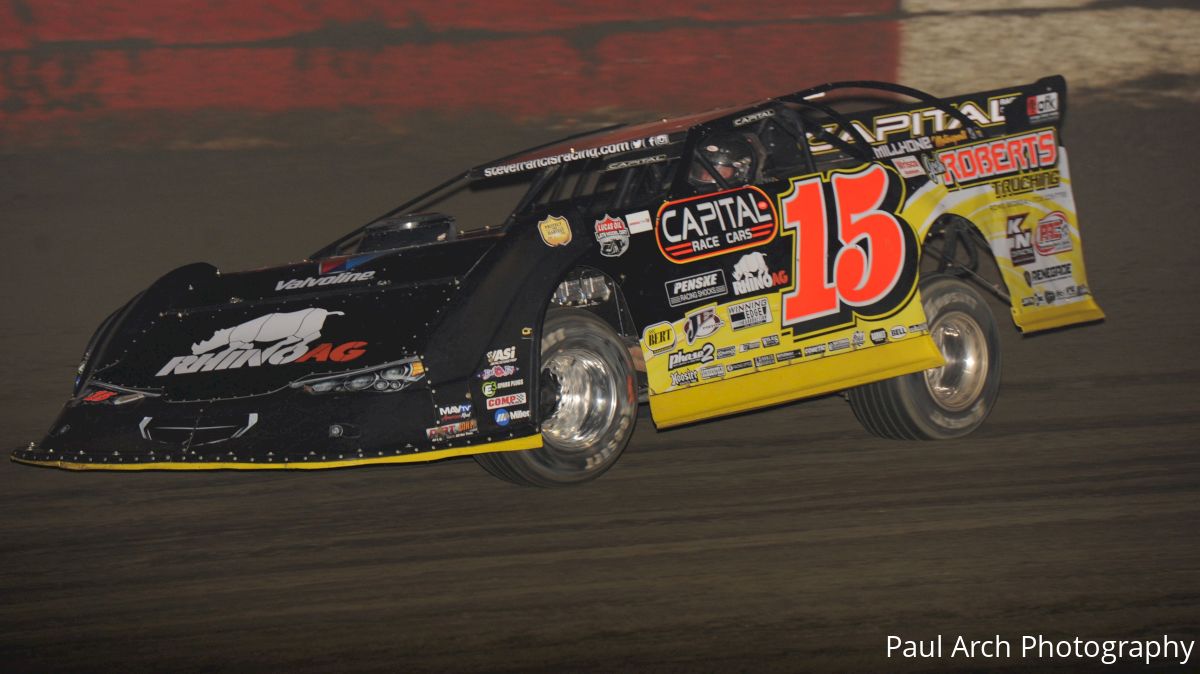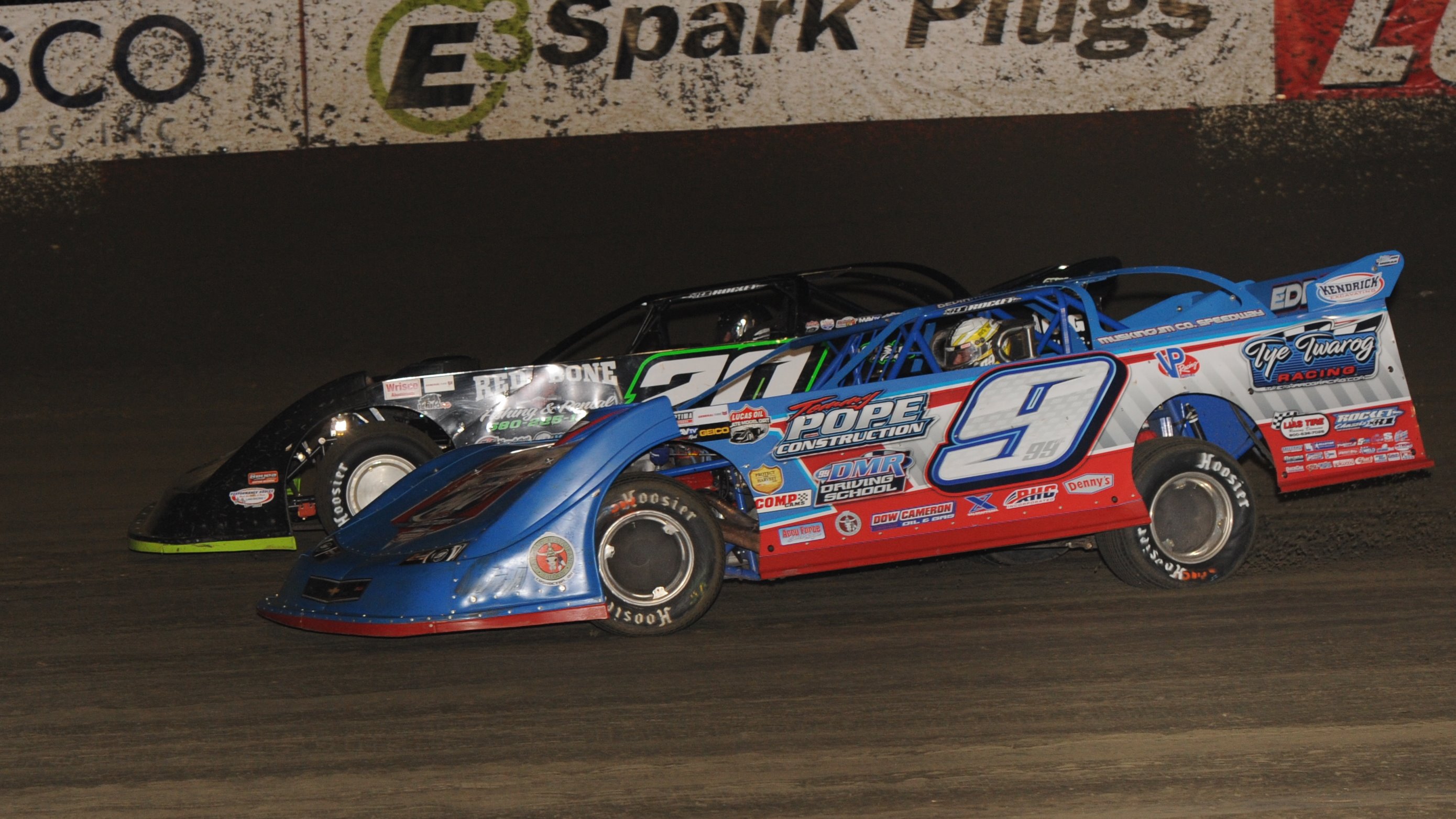To Succeed In Dirt Late Models, It Takes A Driving Desire To Win
To Succeed In Dirt Late Models, It Takes A Driving Desire To Win
The cars, money, trailer, and crew are a huge part of what it takes to run at a national level in dirt racing. Once all of those pieces are in place, it takes a racer with skill and a driving desire to win.

By Jonathon Masters
The cars, money, trailer, and crew are a huge part of what it takes to run at a national level in dirt racing. If you are lacking in any of those departments, it could lead to a short season on the road. While those are things that can be bought and paid for, there is one thing that must be learned through experience: how to adapt your driving skill from that of a weekend warrior to a professional race driver.
In Part I of this series, we looked at the fixed costs of running a late model team from the equipment standpoint. And in Part II, we looked at how difficult it can be to find a crew with enough experience.
Once all of those pieces are in place, it takes a racer with skill and a driving desire to win.
There are drivers at every local track who seem to do no wrong while competing on a week-by-week basis, but when they venture onto the road they look lost on the racing surface. It doesn't matter if they have been racing for five years or 50. There is just something different about driving against national competitors at unfamiliar tracks. While a local hot shoe may be able to run in the top 10 of a national race at his local track, they will rarely be in contention for the victory.
Regional standout Jon Mitchell of Texarkana, Texas, has a theory why.
"To race those guys on the national tours you have to be willing to take chances," Mitchell said. "Those guys will put their cars into holes between cars that locals just aren't willing to do. You have to take to the track without being afraid of tearing something up in order to race them. You have to learn to drive your car a different way."
Mitchell makes a great point that leads back to the factor of the budgets that the national level requires. At the national level, you need to be confident in your crew and finances so that you are able to make the pass without fear of tearing something up. A lot of drivers never get to this point. In a national series, you need to be willing to drive the car harder and without fear.

(Paul Arch Photography)
Devin Moran, the driver of the No. 9 Rocket Chassis, cites the ability to adapt one's driving to different tracks quickly as a key to being a national series racer.
"You have to be ready to prepare your mind to make those changes," the Dresden, Ohio, native said. "No one is ever [able] to totally adapt to everything, but the more you do it the faster your able to adjust. Different tracks and conditions are one of the biggest things you deal with."
The adjustments to your driving style, depending on track conditions, prove too hard to master for many drivers. To this day, a lot of the nation's top drivers still have several tracks they are yet to master. It is a learning curve that can take decades. Though you may have mastered a certain track while it's dry slick, you may still be in the weeds when it is heavy and wet.
A lot of things can be said for the experience it takes to reach the level of driving expertise necessary to race on the big stage, but it's the toll it takes on your personal life that many overlook.
Veteran driver Steve Francis thinks it's something that must be considered by anyone with dreams of being a full-time racer.
"You know, everyone else was out cooking on the grill and spending time with family and friends on Memorial Day and you know where I was at? Driving home from Wheatland, MO," Francis said. "People think it's all glamorous and fun, but what they don't see is you washing your clothes at a laundry mat and not being able to mow your lawn for three weeks.
"There will be times when we are on the road for months on end while everyone else is home playing with their kids and riding ATVs. It gets really hard. What you really sacrifice is the time you get to spend at home with your family. It's being willing to change your life that's the biggest thing that separates a local racer from a national touring driver."
If you do not have that driving desire to dominate and win against the best the late model community has to offer, all the money in the world or the most talented crewmembers will not get you on the podium in the World of Outlaw or Lucas Oil Dirt Late Model Series.
- Jonathon Masters has a lifelong connection with dirt racing. His family has owned and operated MasterSbilt Race Cars manufacturing dirt late model chassis for 35 years. He attended college in North Carolina for motor sports management and has written for various industry publications. Masters was an account executive at The International Motorsports Industry Show, is the founder of the Heartland Auto Racing Show, and has been a racing industry professional for over a decade.
All It Takes To Run A National Tour Is Guts, Talent, And A Half-Million
Steve Casebolt Moves to Jim Beeman Motorsports
Engagement Is One Key To Dirt Racing's Success And NASCAR's Decline
Change What Matters Most In The All-star race
The Changing Of NASCAR's Guard
Kasey Kahne's Future May Have Already Started
The Dillon Brothers' Grassroots Are Deep
The cars, money, trailer, and crew are a huge part of what it takes to run at a national level in dirt racing. If you are lacking in any of those departments, it could lead to a short season on the road. While those are things that can be bought and paid for, there is one thing that must be learned through experience: how to adapt your driving skill from that of a weekend warrior to a professional race driver.
In Part I of this series, we looked at the fixed costs of running a late model team from the equipment standpoint. And in Part II, we looked at how difficult it can be to find a crew with enough experience.
Once all of those pieces are in place, it takes a racer with skill and a driving desire to win.
There are drivers at every local track who seem to do no wrong while competing on a week-by-week basis, but when they venture onto the road they look lost on the racing surface. It doesn't matter if they have been racing for five years or 50. There is just something different about driving against national competitors at unfamiliar tracks. While a local hot shoe may be able to run in the top 10 of a national race at his local track, they will rarely be in contention for the victory.
Regional standout Jon Mitchell of Texarkana, Texas, has a theory why.
"To race those guys on the national tours you have to be willing to take chances," Mitchell said. "Those guys will put their cars into holes between cars that locals just aren't willing to do. You have to take to the track without being afraid of tearing something up in order to race them. You have to learn to drive your car a different way."
Mitchell makes a great point that leads back to the factor of the budgets that the national level requires. At the national level, you need to be confident in your crew and finances so that you are able to make the pass without fear of tearing something up. A lot of drivers never get to this point. In a national series, you need to be willing to drive the car harder and without fear.

(Paul Arch Photography)
Devin Moran, the driver of the No. 9 Rocket Chassis, cites the ability to adapt one's driving to different tracks quickly as a key to being a national series racer.
"You have to be ready to prepare your mind to make those changes," the Dresden, Ohio, native said. "No one is ever [able] to totally adapt to everything, but the more you do it the faster your able to adjust. Different tracks and conditions are one of the biggest things you deal with."
The adjustments to your driving style, depending on track conditions, prove too hard to master for many drivers. To this day, a lot of the nation's top drivers still have several tracks they are yet to master. It is a learning curve that can take decades. Though you may have mastered a certain track while it's dry slick, you may still be in the weeds when it is heavy and wet.
A lot of things can be said for the experience it takes to reach the level of driving expertise necessary to race on the big stage, but it's the toll it takes on your personal life that many overlook.
Veteran driver Steve Francis thinks it's something that must be considered by anyone with dreams of being a full-time racer.
"You know, everyone else was out cooking on the grill and spending time with family and friends on Memorial Day and you know where I was at? Driving home from Wheatland, MO," Francis said. "People think it's all glamorous and fun, but what they don't see is you washing your clothes at a laundry mat and not being able to mow your lawn for three weeks.
"There will be times when we are on the road for months on end while everyone else is home playing with their kids and riding ATVs. It gets really hard. What you really sacrifice is the time you get to spend at home with your family. It's being willing to change your life that's the biggest thing that separates a local racer from a national touring driver."
If you do not have that driving desire to dominate and win against the best the late model community has to offer, all the money in the world or the most talented crewmembers will not get you on the podium in the World of Outlaw or Lucas Oil Dirt Late Model Series.
- Jonathon Masters has a lifelong connection with dirt racing. His family has owned and operated MasterSbilt Race Cars manufacturing dirt late model chassis for 35 years. He attended college in North Carolina for motor sports management and has written for various industry publications. Masters was an account executive at The International Motorsports Industry Show, is the founder of the Heartland Auto Racing Show, and has been a racing industry professional for over a decade.
Exclusive Content
Weekly Columns by Jonathon Masters
Good Men Are Hard To Find For A National TourAll It Takes To Run A National Tour Is Guts, Talent, And A Half-Million
Steve Casebolt Moves to Jim Beeman Motorsports
Engagement Is One Key To Dirt Racing's Success And NASCAR's Decline
Weekly Columns by JD Hellman
Memorial Day Is Christmas For Race FansChange What Matters Most In The All-star race
The Changing Of NASCAR's Guard
Kasey Kahne's Future May Have Already Started
The Dillon Brothers' Grassroots Are Deep